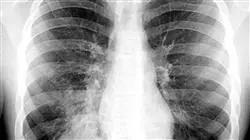University certificate
The world's largest faculty of pharmacy”
Introduction to the Program
A unique, key, and decisive experience to boost your professional development”

Respiratory Infections affect both children and adults and have become one of the leading causes of death in the field of infections. The most frequent are pneumonia and tuberculosis.
The development and spread of bacterial resistance to antibiotics is one of the main problems of infection control in most countries. In fact, the World Health Organization (WHO) cites antibiotic resistance as a major threat to global health, food security and development.
Therefore, pharmacy professionals, regardless of where they work, can see in this Postgraduate certificate the opportunity to take a teaching program that brings together the most advanced and in-depth knowledge of the most important health problems in the field of infectious diseases and microbiology, where a group of scientific professors with extensive international experience provide the most complete and up-to-date information on prevention, diagnosis, treatment and care of individual patients and population groups, suffering from the most prevalent and deadly infectious diseases.
In this case, the program focuses on the most lethal respiratory infections, based on bacterial pneumonias, tuberculosis, Loeffer's syndrome and eosinophilic syndromes. In addition, the most effective antimicrobials in the field of Respiratory Infections.
Increase your decision-making confidence by updating your knowledge through this course"
This Postgraduate certificate endorses the latest advances in infectious diseases with an academic teaching program that positions it as an educational product of the highest scientific quality at international level Additionally, this program provides training and professional development in different areas:
- Clinical symptoms to be able to address the infectious health-disease process in a particular person through the study of the most prevalent and deadly infectious diseases, and, in Epidemiology, to study the behaviour of the same phenomenon in a population
- Indication, performance and interpretation of the main state-of-the-art diagnostic tests to complement clinical skills in the diagnostic process. Emphasizing the most up-to-date microbiological tests used to rapidly diagnose germs and study antimicrobial
- The complex and determining pathophysiological relationships between the immune response and infectious agents
- Germs related to neoplasms and chronic non-communicable diseases
- Development and production of vaccines for the control of morbidity and mortality due to infectious diseases
- The important field of antimicrobial therapeutics, providing the best available information on the development and production of new antibiotics
Don't miss the opportunity to update your knowledge in Respiratory Infections and earn a qualification from the world's leading online university"
Its teaching staff is made up of prestigious and renowned professionals with a long career in health care, teaching and research, who have work in many countries on several continents, developing professional and teaching experience that they deliver in an extraordinary way in this Postgraduate certificate.
The methodological design of this Postgraduate certificate, developed by a multidisciplinary team of e-learning experts, integrates the latest advances in educational technology for the creation of numerous Educational multimedia tools that allow the professional, based primarily Problem the problem-based learning method, to address real problems in their daily clinical practice, which will allow them to advance by acquiring knowledge and developing skills that will impact their future professional work.
It should be noted in this Postgraduate certificate that each of the contents generated, as well as the videos, self-evaluations, clinical cases and exams, have been thoroughly reviewed, updated, and integrated by the teachers and the team of experts that make up the working group, to facilitate the learning process with a step-by-step approach in order to achieve the teaching program objectives.
Take this Postgraduate Course and you will see that it is the best educational option for pharmacy professionals"

Infections are a serious health problem, so it is imperative that pharmacists continue to be trained to advance in this field"
Why study at TECH?
TECH is the world’s largest online university. With an impressive catalog of more than 14,000 university programs available in 11 languages, it is positioned as a leader in employability, with a 99% job placement rate. In addition, it relies on an enormous faculty of more than 6,000 professors of the highest international renown.

Study at the world's largest online university and guarantee your professional success. The future starts at TECH”
The world’s best online university according to FORBES
The prestigious Forbes magazine, specialized in business and finance, has highlighted TECH as “the world's best online university” This is what they have recently stated in an article in their digital edition in which they echo the success story of this institution, “thanks to the academic offer it provides, the selection of its teaching staff, and an innovative learning method aimed at educating the professionals of the future”
A revolutionary study method, a cutting-edge faculty and a practical focus: the key to TECH's success.
The most complete study plans on the university scene
TECH offers the most complete study plans on the university scene, with syllabuses that cover fundamental concepts and, at the same time, the main scientific advances in their specific scientific areas. In addition, these programs are continuously being updated to guarantee students the academic vanguard and the most in-demand professional skills. In this way, the university's qualifications provide its graduates with a significant advantage to propel their careers to success.
TECH offers the most comprehensive and intensive study plans on the current university scene.
A world-class teaching staff
TECH's teaching staff is made up of more than 6,000 professors with the highest international recognition. Professors, researchers and top executives of multinational companies, including Isaiah Covington, performance coach of the Boston Celtics; Magda Romanska, principal investigator at Harvard MetaLAB; Ignacio Wistumba, chairman of the department of translational molecular pathology at MD Anderson Cancer Center; and D.W. Pine, creative director of TIME magazine, among others.
Internationally renowned experts, specialized in different branches of Health, Technology, Communication and Business, form part of the TECH faculty.
A unique learning method
TECH is the first university to use Relearning in all its programs. It is the best online learning methodology, accredited with international teaching quality certifications, provided by prestigious educational agencies. In addition, this disruptive educational model is complemented with the “Case Method”, thereby setting up a unique online teaching strategy. Innovative teaching resources are also implemented, including detailed videos, infographics and interactive summaries.
TECH combines Relearning and the Case Method in all its university programs to guarantee excellent theoretical and practical learning, studying whenever and wherever you want.
The world's largest online university
TECH is the world’s largest online university. We are the largest educational institution, with the best and widest online educational catalog, one hundred percent online and covering the vast majority of areas of knowledge. We offer a large selection of our own degrees and accredited online undergraduate and postgraduate degrees. In total, more than 14,000 university degrees, in eleven different languages, make us the largest educational largest in the world.
TECH has the world's most extensive catalog of academic and official programs, available in more than 11 languages.
Google Premier Partner
The American technology giant has awarded TECH the Google Google Premier Partner badge. This award, which is only available to 3% of the world's companies, highlights the efficient, flexible and tailored experience that this university provides to students. The recognition as a Google Premier Partner not only accredits the maximum rigor, performance and investment in TECH's digital infrastructures, but also places this university as one of the world's leading technology companies.
Google has positioned TECH in the top 3% of the world's most important technology companies by awarding it its Google Premier Partner badge.
The official online university of the NBA
TECH is the official online university of the NBA. Thanks to our agreement with the biggest league in basketball, we offer our students exclusive university programs, as well as a wide variety of educational resources focused on the business of the league and other areas of the sports industry. Each program is made up of a uniquely designed syllabus and features exceptional guest hosts: professionals with a distinguished sports background who will offer their expertise on the most relevant topics.
TECH has been selected by the NBA, the world's top basketball league, as its official online university.
The top-rated university by its students
Students have positioned TECH as the world's top-rated university on the main review websites, with a highest rating of 4.9 out of 5, obtained from more than 1,000 reviews. These results consolidate TECH as the benchmark university institution at an international level, reflecting the excellence and positive impact of its educational model.” reflecting the excellence and positive impact of its educational model.”
TECH is the world’s top-rated university by its students.
Leaders in employability
TECH has managed to become the leading university in employability. 99% of its students obtain jobs in the academic field they have studied, within one year of completing any of the university's programs. A similar number achieve immediate career enhancement. All this thanks to a study methodology that bases its effectiveness on the acquisition of practical skills, which are absolutely necessary for professional development.
99% of TECH graduates find a job within a year of completing their studies.
Postgraduate Certificate in Respiratory Infections
Our Postgraduate Certificate in Respiratory Infections is the ideal training for those health professionals interested in specializing in the area of respiratory tract infections. Respiratory infections are a global health problem affecting millions of people worldwide. An in-depth knowledge of the different types of respiratory infections, their causes, symptoms, diagnosis and treatment is essential to provide quality care to patients and contribute to their early recovery. Our academic program is designed by experts in the field and has a theoretical and practical approach in online mode, which will allow participants to acquire the necessary knowledge to deal with these diseases effectively.
Learn with TECH's practical methodology
During the Postgraduate Certificate, students will be able to learn about the main infections of the respiratory system, such as the common cold, flu, pneumonia, bronchitis and tuberculosis, among others. In addition, the causes and risk factors of these diseases will be addressed, as well as the prevention and control measures that must be implemented to avoid their spread. TECH has a practical methodology where participants will find specialized readings, multimedia resources and a virtual library, as well as different tools hosted on our platform available 24 hours a day, which work as an ideal complement to the online meetings with specialist teachers. At the end of the course, participants will receive a Postgraduate Certificate accrediting their training in the area of Respiratory Infections. This certificate will allow them to stand out in the work field and will open new opportunities for professional growth. Don't miss the opportunity to specialize in this important field of medicine. Enroll today in our Respiratory Infections Postgraduate Certificate and become an expert in the diagnosis and treatment of these diseases. We are waiting for you!







